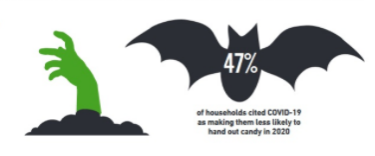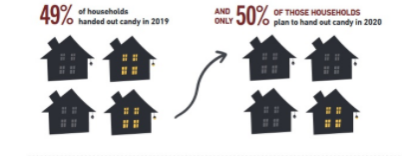The idea that COVID-19 could “cancel” Halloween is absurd for many — but for most, it won’t be trick-or-treat as usual.
With health and safety guidelines requiring social distancing, Halloween lovers have gotten creative with ideas to distribute candy safely, but alternatives to trick-or-treating and Halloween parties, like drive-by viewing of Halloween decorations, binge watching Halloween movies or even a virtual haunted house walkthrough, are what Halloween will look like for many.
Only 26% of Americans say they are likely to participate in Halloween activities this year, with another 27% unsure if they’ll participate.
That’s according to a recent University of Delaware study, led by Brandon McFadden, an assistant professor at UD’s College of Agriculture and Natural Resources, and Nora Messer, a student at the Charter School of Wilmington, along with Trey Malone, an assistant professor at Michigan Sate University, and Kabir Advani, a student at the Palo Alto High School in California.

For the study, 2,034 people aged 18 through 85 from across the United States took an online survey, called the Pandemic Consumer Food and Stigma Survey, administered by Qualtrics in late September. The data visualization of the findings was published online by Choices, a publication of the Agricultural and Applied Economics Association.
Trick-or-treating, while not forbidden by the Delaware Department of Health, does come with recommendations, such as no-contact candy distribution and outdoor mask wearing — and at-home family activities like indoor candy scavenger hunts are recommended more highly.

Houses that participated in the trick-or-treat tradition in 2019 (about half of all U.S. households) are split down the middle over whether they’ll be handing out candy this year, with 50% planning to keep the porch light off this year. That comes out to only about 25% of houses offering candy to track-or-treaters in 2020.
And while many families — about 40% — intend to consume the same amount of candy this year as usual, 42% plan to consume less, which is good news for teeth, but not so good news for Halloween sales.







